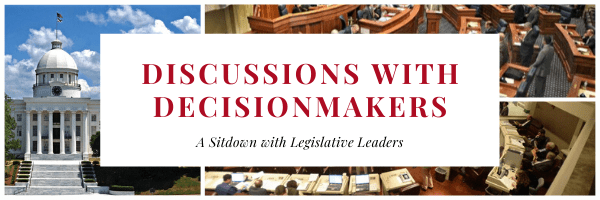1. Please tell us a little bit about yourself – Primary occupation? Interests? Hobbies?
I’m an accountant by education, and received my bachelor’s degree from Mississippi State University. Following college, I served as an officer in the U.S. Marine Corps. From there, I went to work with IBM and eventually left to open my own company, Computer Leasing Company, Inc.
In the community, I have served in various roles with various organizations, including past President of the Huntsville Rotary Club, past Chairman of the Madison County Republican Executive Committee, past Co-chairman of the Chamber of Commerce Free Enterprise Committee, past Vice President of the Metropolitan YMCA Board, and I was a member of the Alabama Commission on Aerospace Sciences and the Alabama Management Improvement Program.
Today, I am a board member of the Alabama Space and Rocket Center, Volunteers of America of North Alabama, YMCA, Alabama Men’s Hall of Fame, and Alabama Board of Medical Scholarship Awards (BMSA).
Finally, I would be remiss if I didn’t also mention my wife, Dot, and our three children: Mary Ann, Peggy, and Betty.
2. What first prompted you to consider running for your House District seat and how do you believe your background and experiences help you serve in the legislature?
Following retirement from IBM, I became more involved in political organizations in the Huntsville area. When then-representative and democrat, Stephen Hettinger, left the seat in 1988 to become mayor of Huntsville, the Madison County GOP was looking for a candidate to run for the seat. As it turned out, nobody wanted to do it; so, the Executive Committee asked me to run for District 20 as a republican.
Frankly, the last thing I wanted to do is run the highway from Huntsville to Montgomery. Now, 32 years (1988 – Present) later, I guess the position was meant for me.
3. Every legislative session, you are a leading voice in bringing awareness to one of the Medical Association’s top priorities – increasing funding for the Board of Medical Scholarship Awards (BMSA) and ensuring there are primary care physicians working in rural, medically underserved areas of the state. Tell us a little about why this issue is so important to you.
This is a funny story. I actually had no idea that I was being appointed. In fact, I found out at a legislative reception one evening years ago when Governor Hunt approached me and said, “I appointed to you a board today. I forgot which one but I’ll send you a letter.” It just so happened to be the BMSA.
BMSA is a tremendous program. I’m extremely glad Governor Hunt decided – for whatever reason – to appoint me to this board. The program deserves more money to put more physicians in areas of need because year after year we have more applicants than we do scholarships. And every one of these applicants is the “best of the best.”
4. By increasing funding for the BMSA, if Alabama is able to reverse the trend of having a shortage of primary care physicians, what kind of message does that send for the state’s ability to tackle other troubling health care issues?
This program has a major impact on healthcare in Alabama. Most physicians in these areas struggle to pay of their loans or succeed. Those who are selected for the BMSA are typically the top of their class and have a true desire to give back to communities who lack proper access. These young men and women want to go serve rural Alabama; it’s unfortunate we cannot provide them with the money to help them do it.
5. If you could change one thing about our state’s health care system, what would it be?
More physicians. Even I have struggled to find a physician, and I live in Huntsville. Those in areas with one or two – or even zero – physicians face even more burdensome hurdles.
6. How can the Medical Association – and physicians statewide – help better address Alabama’s health challenges?
Whether it be bills before my Committee – Boards, Agencies, and Commissions – or others being considered by the entire House, the Medical Association has always been there to provide us with much needed information. Continuing to do so is needed and much appreciated.
7. What’s the one thing you would like to say to physicians in your district?
We appreciate you. My wife and I have seen a fair share of physicians over the years – from broken bones of our children to our own personal illnesses – and we are grateful for the care we received. These are unique times, but we will make it through. Keep up the good work.
